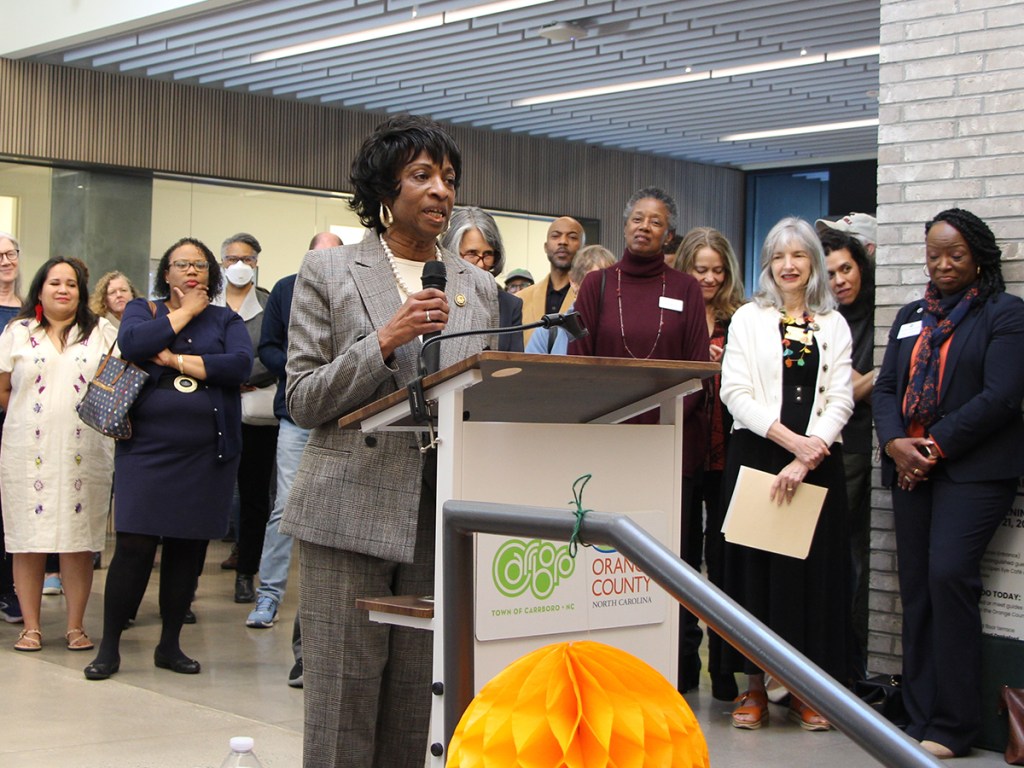When Mark Adams looks at the dismantling of American foreign aid, he sees something disturbingly familiar.
Before he was fired in March, Adams, a Durham resident, served as senior humanitarian advisor to the Yemen Affairs Unit. His job took him to countries experiencing crises of governance.
“In the places I served in Zimbabwe and Pakistan and Sudan, the reason I went there is because they were having what we call complex emergencies: essentially, less diplomatic speak for a man-made disaster,” Adams says, adding, “And it is always men.”
Now Adams finds himself among hundreds of Triangle residents who’ve lost their jobs in an unprecedented hollowing out of America’s international development infrastructure. He’s not just worried about his next paycheck but the collapse of an entire field dedicated to global stability.
“I see in Trump the diminishing of the principles that have upheld our governance structures,” Adams continues. “It’s leading to this country’s own complex emergency, essentially.”
The Trump administration’s cuts to the US Agency for International Development (USAID) have left the agency as little more than a nominative entity. Less than 900 of 6,000-plus employees have been retained globally. The cuts extend far beyond direct government employees, affecting thousands of contractors, grantees, and implementing partners who carry out most of USAID’s actual work. By September, the Trump administration has said, USAID’s remaining operations will be folded into the State Department, ending its 64-year history as an independent agency.
The impact of the cuts on North Carolina has been particularly severe. The state ranks as the fourth-highest recipient of USAID funding nationwide, with the fourth congressional district—comprising Durham, Orange, Granville, and parts of Wake counties—ranking fourth among all 435 congressional districts in the country. Foreign aid has historically infused North Carolina’s economy with more than $1 billion annually.
As of early April, hundreds of Triangle workers have lost their jobs. The cuts have affected major organizations including RTI International, FHI 360, and Palladium Group, as well as numerous universities and smaller contractors.
While workers in the Triangle are outraged at Trump officials, many are also expressing frustration over what they describe as insufficient leadership from the electeds who represent them in D.C.
Workers note that North Carolina’s Republican U.S. senators, Thom Tillis and Ted Budd, have remained largely silent on the USAID cuts. Neither senator has addressed the impact of foreign aid cuts on their state, according to their websites. In February, dozens of protesters gathered at Budd’s office and implored him to decry DOGE’s role in dismantling USAID.
And workers say they want to see more urgency from Rep. Valerie Foushee in particular, given that she’s a Democrat who represents the district receiving the fourth-highest amount of USAID funding nationwide. Foushee has taken some steps, sponsoring legislation and recently joining an amicus brief with over 200 House Democrats challenging the administration’s directives to dismantle USAID. In an April 2 release, Foushee noted that the cuts “have already halted countless research projects and cost thousands of foreign aid workers their jobs here in the Fourth District.”
But workers are disappointed with Foushee’s communication. They point to a telephone town hall in February that consisted mostly of speeches with little time for constituent questions, her boycott of Trump’s joint speech to Congress in March without an alternative event for constituents, and at least one newsletter sent during the peak of the USAID cuts that didn’t mention the local economic impact.
Durham resident Kirsten Weeks was furloughed on January 31 after over 25 years in the field. Weeks was overseeing health portfolios for USAID, working on pandemic threats, health security, and pharmaceutical supply chain issues in countries like Bangladesh and Malawi. Her expertise helped track outbreaks of diseases like anthrax and avian flu while building local capacity for healthcare delivery—work that’s now completely halted.
When Weeks reached out to Foushee’s office about the crisis last month, she received what she describes as a tone-deaf response touting failed legislation from two years ago.
“She referenced that she had co-sponsored legislation two years ago to support UNFPA, but that legislation didn’t pass,” Weeks says, referencing H.R. 4166, a bill from the previous Congress to support the United Nations Population Fund, a global reproductive health agency. “Honest to God, if they just used AI to be like, ‘How could these messages resonate with my constituents?’ it would be an improvement.”
Weeks’ frustration mirrors broader concerns about how Democrats are engaging with voters. In a New York Times podcast last week, former Obama speechwriter Ben Rhodes criticized Democrats for sounding like they’re “running some kind of freshman seminar at some pointy-headed college.”
“There’s this kind of consultant language that just needs to go away,” Rhodes said. “That was always annoying to people. But when your opponent, Donald Trump, is clearly not on any consultant-speak, it just makes it more glaring that you seem like the typical politicians.”
A Politico analysis of recent polling shows this disconnect and its consequences. Democratic voter approval of congressional representatives has plummeted from 75 percent to 40 percent in one year—a historic low that analysts are comparing to the discontent that enabled Donald Trump’s insurgent takeover of the Republican party.
Weeks has specific ideas about actions Foushee could take. She suggests Foushee could file Freedom of Information Act requests to determine why her constituents aren’t being paid, and could advocate more aggressively with Attorney General Jeff Jackson to include USAID in lawsuits against the federal government. Foushee tells the INDY she is in the process of requesting information on why Triangle-based contractors haven’t been paid for completed work, and that while her office is in touch with Jackson, “we cannot dictate what is done on the state-level.”

Jesse Hastings spent years coordinating lifesaving HIV and COVID-19 treatments across 26 countries. Last month, the Durham resident became another statistic in the foreign aid collapse when Palladium Group handed him a termination notice.
“We’re not just wondering if we have a job to go back to,” says Hastings, who until March served as the senior advisor of communications and knowledge management for a $110 million project operating in sub-Saharan Africa and Latin America. “We’re wondering whether we have a career to go back to.”
As a communications professional, he has thoughts on effective messaging strategy for representatives at all levels of government.
“Abstract concepts, like deaths around the world, our loss of America’s standing in the world: those concepts have proven to be ineffective,” Hastings says. “In America, in our transactional society, if you can push the economic impact, then you might get some resonance with people on the other side of the aisle.”
Hastings was glad to see Foushee at a protest in Washington in early February opposing DOGE cuts, but says he doesn’t “feel like we’re getting as much action as I was hoping for.” (Another tidbit from the New York Times podcast: Rhodes cautioned against demonstrations focused on Washington, DC. “In recent days you’ve seen Democrats protesting outside of USAID when it was shuttered,” Rhodes said. “That shouldn’t happen—and I say that as someone who’s profoundly concerned about shuttering those agencies. They should protest at a Veterans Affairs center in somebody’s congressional district out in the country.”)
“If people are silent or complicit, we’ve already lost,” Hastings says. “What works in my experience is regular engagement. You have to be able to communicate effectively, concisely, and really directly.”
Two workers who requested anonymity shared similar perspectives. One, a foreign aid worker with over 20 years of experience who still holds a position at a Triangle organization and requested anonymity because their employer has policies against speaking to reporters, says officials in heavily Democratic districts like NC-04 have more freedom to be outspoken.
“When you’re in a blue area, where you know you have the backing of your voters, you can take more risks, and you can be louder knowing that your voters support you,” the worker says.
That said, Foushee’s “staff have been really responsive and very eager to learn and help her learn and get up to speed,” the worker says. The worker also emphasizes that Foushee is doing more than Tillis or Budd, noting “our senators have a bigger mic and more power, and they are doing less than” Foushee.
In response to requests for comment, Foushee’s office stated she is “deeply concerned regarding the illegal actions taken by the Trump Administration” and is “actively working with House Democrats to counter this administration’s disastrous order on all fronts.” Her office cited letters to the administration opposing the funding cuts and co-sponsorship of H.R. 1196, the Protect U.S. National Security Act, which would prohibit using federal dollars to eliminate USAID.

Workers who spoke with the INDY pointed to responses from legislators in other states as examples of more proactive leadership. Maryland Rep. Jamie Raskin has personally called constituents who lost their jobs, organized town halls specifically addressing USAID cuts, and led House Democrats in filing an amicus brief challenging the administration’s directives in court. New Jersey Sen. Andy Kim has made regular appearances at rallies with affected workers and framed foreign aid as a matter of American jobs and economic strength rather than abstract international policy.
Workers say they appreciate that local municipalities have taken action. Durham City Council unanimously passed a resolution on March 17 condemning the funding freeze, following similar actions in Chapel Hill and Carrboro. Durham Mayor Leonardo Williams recently appeared on CNN to discuss the local impact.
These local and congressional efforts come as legal challenges to DOGE’s actions continue. The Trump administration has attempted to cut 92 percent of USAID foreign aid contracts. On March 5, the Supreme Court upheld a lower court order requiring the administration to pay contractors approximately $2 billion for work already completed. And on March 18, a federal judge ruled that DOGE’s dismantling of USAID likely violates the Constitution. Still, the rulings didn’t immediately reinstate funding or jobs.
Brianna Clarke-Schwelm, the executive director of the North Carolina Global Health Alliance, says she cannot comment on specific elected officials due to her organization’s need to maintain relationships across the political spectrum, but emphasizes that North Carolina representatives should be at the table in discussions about the future of American leadership in international development.
“In this moment of tremendous uncertainty, what I want to see from all of our representatives on both sides is real leadership on behalf of what makes our state really special,” she says.
“I’ve lived in North Carolina for almost a decade,” Clarke-Schwelm continues, “and something that became really clear to me very early on is how proud North Carolinians are of sweet potatoes. What I’ve always wanted is for North Carolinians to have that kind of pride for our global health sector. We are a state that produces the best freaking sweet potatoes, and we are a state that is a true center of global health. We should be proud of that.”
Support independent local journalism. Join the INDY Press Club to help us keep fearless watchdog reporting and essential arts and culture coverage viable in the Triangle.
Follow Staff Writer Lena Geller on X or send an email to [email protected]. Comment on this story at [email protected]
